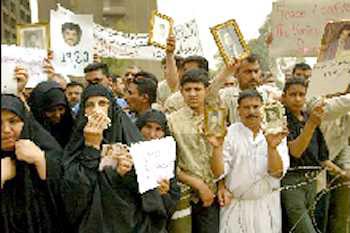U.S. Secretary of State Colin Powell is due in Syria soon, presumably to discuss Washington's contentions that Syria sponsors terrorism and harbors remnants of Saddam's regime. Rahall and Issa depicted Assad as eager to address the U.S. concerns. Seven thousand miles away, President Bush planned to attend Easter services with soldiers at Fort Hood in Texas, then meet privately with two Apache helicopter crewmen who were freed a week ago from captivity in Iraq. The two crewmen were among seven former POWs who returned home Saturday to a joyous welcome from family and well-wishers at Fort Hood and Fort Bliss. "This almost makes me as nervous as being shot at," said Chief Warrant Officer Ronald D. Young Jr., one of the Apache crewmen. "We really appreciate the support." At the Vatican, Iraq figured in Pope John Paul II's Easter message to the world - he said the Iraqi people themselves, aided by other nations, should determine their country's future. "Peace in Iraq!" proclaimed the pontiff, drawing cheers from a rain-soaked crowd in St. Peter's Square. "With the support of the international community, may the Iraqi people become the protagonists of their collective rebuilding of their country." Under the redeployment of U.S. troops in Iraq, all Marines who were in east Baghdad are pulling out to consolidate in the southern half of the country, while Army units will control the entire capital and the northern half of the country. The shift will dramatically reduce the number of American troops in Baghdad, although precise figures were not released. Also Sunday, physicians and nurses at Nasiriya's main hospital told CNN they defied Iraqi leaders to bring food, clothes and medicine from their own limited supplies to Army Pfc. Jessica Lynch while she was held captive there. Dr. Ahmed Muhsin said Lynch's guards beat her and tried to stop doctors from checking her more than twice a day. Lynch was rescued in a commando raid April 1 and is recuperating in Washington. In Baghdad, soldiers met Sunday with community leaders and discussed security concerns. A U.S.-run radio station - Information Radio - read a statement announcing an 11 p.m.-6 a.m. curfew. "Anyone who violates this curfew will put himself in danger," one announcer said. Another advised people not to carry weapons "because you might be considered a threat to coalition forces." A longtime exile who has proclaimed himself in charge of Baghdad said Sunday that Iraq's new constitution would be derived from Islamic law and promised to try anyone whose "hands are stained with the blood of the Iraqi people." Mohammed Mohsen al-Zubaidi also announced plans to revive Baghdad's civil administration. It remained unclear where his authority comes from or if it exists at all; no U.S. officials attended his news conference. Al-Zubaidi is a deputy of Ahmad Chalabi, a top figure in the Iraqi National Congress, an opposition group long backed by Washington. As he spoke, one of his associates said - without providing details - that police had discovered documents from Saddam's intelligence service about "people responsible for killing innocent people all over the world." Chalabi, interviewed Sunday on ABC's "This Week," said Iraq needed a constitution that would deter religious parties from trying to establish a permanent Islamic state. "There is a role for Islamic religious parties, for they have some constituencies. But they are not going to be forcing any agenda or forcing a theocracy on the Iraqi people," Chalabi said. "We do not think that an election, one election, should determine permanently the nature of the state in Iraq." Shiites, 60 percent of Iraq's 24 million people, were repressed under Saddam's regime, which was dominated by Sunni Muslims. By the thousands, Shiites from Baghdad and elsewhere were marching Sunday toward the holy cities of Karbala and Najaf on an annual religious pilgrimage that was discouraged for decades by Saddam. For Shiites in their 20s and 30s, it was their first time on the march. For older men like Hussein Saman, 48, imprisoned for 11 years for openly practicing Shiite rituals, it was his first pilgrimage since the 1970s. "In the days of Saddam, if anyone did this march, he was killed," said Saman. As many as 2 million Shiites from Iraq, Iran and elsewhere are expected to converge on the two holy cities - a major test for U.S. forces seeking to establish order in Iraq. One leading Shiite cleric - Ayatollah Mohammed Baqir al-Hakim, head of an Iran-based anti-Saddam movement - has suggested that marchers express their rejection of the U.S. military presence. U.S. troops were seeking a low profile, even as they stockpiled emergency food and water for the pilgrims. "We don't want to interfere with the pilgrimage.... But we are prepared for the worst," said Maj. James M. Bozeman of the 82nd Airborne Division. The pilgrimage marks 40 days after the date on which Hussein - a grandson of the Prophet Muhammad - is believed to have been killed in Karbala. For Christians among the American troops, Easter services were offered at several sites where soldiers on patrol duty have been sleeping on the ground or in vacated public buildings. On the grounds of an Iraqi air defense school, 30 soldiers of the 101st Airborne gathered - camouflage Bibles in hand - for a service conducted by Chaplain Maj. John Routzhan. Behind him, a cross stood upright in a mound of sand. Encouraged by Routzhan to share thoughts and prayers, one soldier said his wife's pregnancy is going well. Another said he was celebrating his 36th birthday. Sgt. 1st Class John Stroman, 40, of Orangeburg, S.C., was thankful they had survived the war. "We had a hard time when we first came over here. But He protected us from all harm and danger," Stroman said. |
